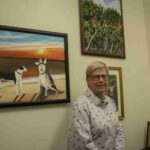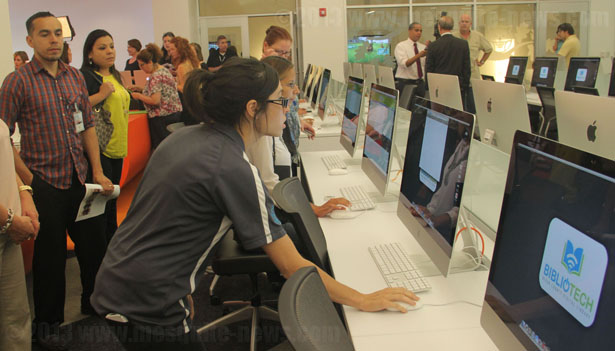
By Alma Linda Manzanares
Bexar County’s bookless library, BiblioTech, is set to hold its grand opening from 10 a.m. to 2 p.m. Saturday at 3505 Pleasanton Road, with 10,000 book titles and 600 e-readers for the public to check out.
Ashley Eklof, head librarian of the BiblioTech, said the idea formed after Bexar County Judge Nelson Wolff read the authorized biography of Steve Jobs by Walter Isaacson. “The whole concept of technology advances: He just thought the timing was right for now to have this sort of all-digital facility,” she said.
The first in the nation, the library was funded with $2.5 million from Bexar County’s general fund, said Laura Jesse, public information officer for Bexar County. She said the cost includes the buildout of the space, ordering the technology and creating the digital collection. Jesse added that the Hidalgo Foundation of Bexar County has been raising private money to supplement the budget.
The building of a digital-only library has gained recognition by national news outlets such as ABC.
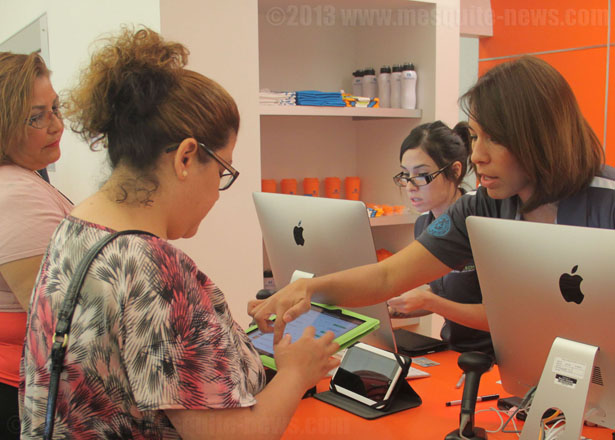
Eklof said a South Side base was chosen for the library because “there is a need here.” She said county-gathered statistics estimate 55 percent of the area households do not have a broadband connection and 94 percent express the need for more library computers available to the public. “They saw a need here because there are libraries in the city of San Antonio but not necessarily in the growing suburbs in Bexar County. So this area, they didn’t seem to have a service like this,” Eklof said.
BiblioTech will be open noon-8 p.m. Monday through Friday and 10 a.m.-6 p.m. Saturday and Sunday.
At a recent soft opening, visitors entered the library lined with Mac desktop computers, closely resembling an Apple store. Groups of people were led on tours through the various areas of the building by library staff. Children could be seen playing games on interactive tables in the children’s area, which is partitioned by glass windows.
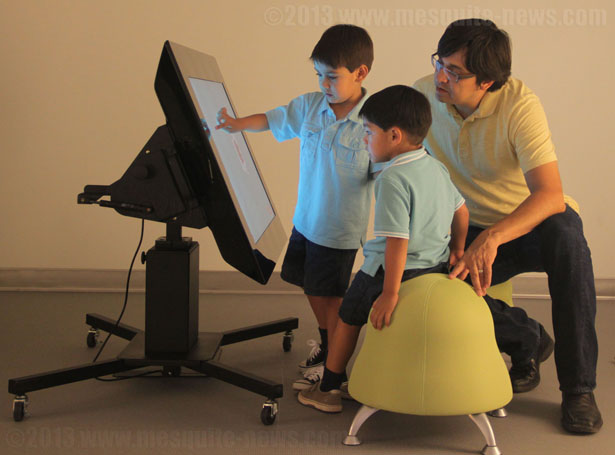
In order for patrons to check out items through the BiblioTech, they must have a library card, different from the city’s public library system. A registration form can be found on the BiblioTech website or at the BiblioTech circulation desk, Eklof said. To complete registration, a proof of address must be submitted to personnel at the library to verify patrons live in Bexar County, she said.
Eklof said the BiblioTech has 600 e-readers, which do not require Internet access outside the library and allow five e-books to be checked out per e-reader. The library also has 200 children’s e-readers, preloaded with 100 e-books. All e-readers are available for check out for two weeks.
After two weeks, if an e-reader has not been returned, a $1 a day charge will be added to the patron’s account, Eklof said. The maximum late fee charge is $14. “After that, if someone has not come back to renew the e-reader, the e-reader is marked as lost and the replacement fee will be marked on their account,” she said. Eklof added that a patron can still bring the device back in good condition to avoid paying the $150 replacement fee, but still be responsible for the $14 late fee.
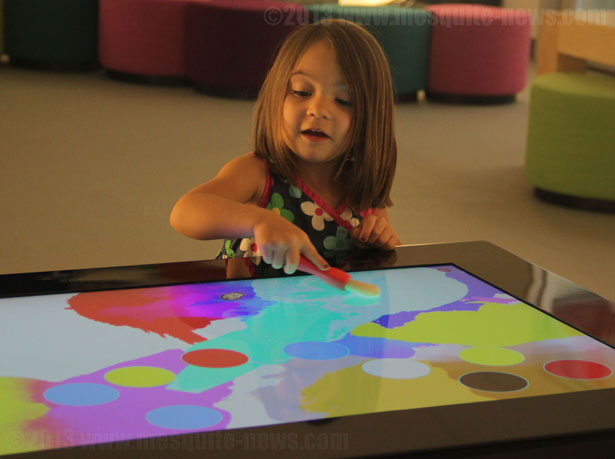
Patrons with their own devices can also check out e-books through the 3M Cloud Library app, Eklof said. The app is available for download on iOS, Android, PC, Nook, MAC and Kindle Fire.
“When you check out an e-book on your own device through the app, the app will count down the time you have left for the book and wipe it off your device when the two weeks are up,” Eklof said.
BiblioTech registered users also have access to audio books and foreign language learning. Both require patrons to download apps on their personal devices.
In addition to check-out items, the library will have 48 desktops, 10 laptops and 40 iPads available for in-library use for one hour.
“Some of these features are really incredible in terms of being convenient,” Eklof said. She explained that if a patron went on vacation, they could easily use the library’s resources online through their devices or a checked out e-reader. “Now with technology, we’re so used to convenience. We don’t ask for directions, we just Google it,” Eklof continued. “We get answers immediately with Yahoo Answers. We’re used to the convenience of it and libraries need to keep up, in my opinion.”
She said although BiblioTech will not have all the services a university library offers, students can benefit from accessing resources on the Bibliotech website, which include the Library of Congress Internet Archive, Library of Congress American Memory, TexShare databases, e-books through Project Gutenberg and audio books through Librovox.
“We do have educational databases because we are accredited to Texas State Library (and Archives Commission),” Eklof said.
BiblioTech gained its accreditation from the Texas State Library and Archives Commission June 20. This allows the library to participate in the TexShare program, which includes access to 52 electronic full-text databases.
Eklof said the library can also be used to reserve meeting space for community events or students meeting up with classmates. “Really, we serve all the purposes that a public library serves and with a big focus on technology, a big focus on literacy and a big focus on community,” she said.
Jesse said in the future, the county “absolutely” plans to have more than one location for the BiblioTech.
She said the county has never operated a library system, instead the county would fund about $4 million a year to the San Antonio Public Library in order for citizens in unincorporated Bexar County to use library services. She added that the city cannot build a library outside city limits even though the county was contributing funds.
“The judge (Wolff) wanted to find something that we can do easily and inexpensively and put in various parts of unincorporated Bexar County,” Jesse said.
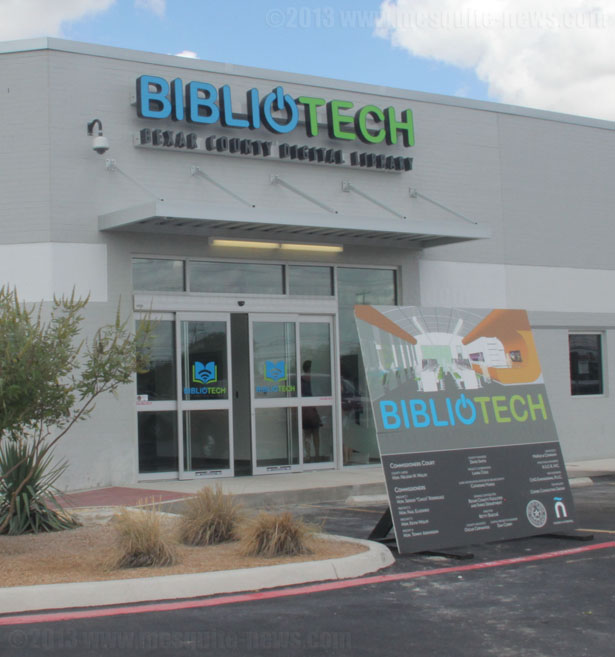
A&M-San Antonio e-book accessibility
Texas A&M-San Antonio is also keeping up with digital technology.
The university’s “e-purpose” library has access to about two million e-books, about 111 databases and research guides dedicated to specific courses available to students online, University Librarian Stefanie Wittenbach said.
She said the library is considered an “e-purpose” library because the majority of the library’s resources are available online. “If a book or a journal is available both in a print format or an electronic format, we’re only going to buy the digital version,” Wittenbach said.
Databases provide access to scholarly journal articles and original documents that have been scanned by America’s Historical Imprints and America’s Historical Newspapers, she said.
Wittenbach said research guides are subject and course specific, so the guides narrow the resources in the library to those that pertain to the subject or course.
She added that the library creates their own content for the “Get S.M.A.R.T. @ Your Library” program, which features a series of workshops and online tutorials designed to help students with different aspects of research, writing, and presentation skills.
Wittenbach said university libraries are important because they partner with faculty to support their courses and provide research materials for student projects. She noted that public libraries cater to the personal aspect of their visitor’s lives, while university libraries cater to educational activities.
In addition to an “e-preferred” library, A&M-San Antonio has an e-book program that currently serves about 230 courses, according to Tracy Hurley, interim associate vice president for academic affairs. The program was funded through a post-secondary grant from the U.S. Department of Education and launched in 2010.
Hurley said along with trying to make textbook costs cheaper, benefits of e-books include portability and accessibility.
“One of our objectives for the program was to not only bring down the price of textbooks for students but also make them accessible for students regardless of their ability to pay for them,” she said.
Students who are in a course that participates in the program are automatically charged a course fee to their tuition and fees for the e-book. “They have access to the published material they need to be successful in the course,” Hurley said.

